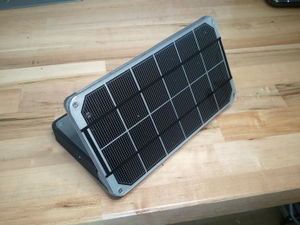No edit summary |
Nitinpatel (talk | contribs) m (→References) |
||
| (16 intermediate revisions by 4 users not shown) | |||
| Line 1: | Line 1: | ||
[[File:a.jpg|thumb|right|The Solar Charger or Emergency Light.]] | [[File:a.jpg|thumb|right|The Solar Charger or Emergency Light.]] | ||
{{Statusboxtop}} | |||
{{status-design}} | |||
{{status-model}} | |||
{{status-prototype}} | |||
{{boxbottom}} | |||
== Project Description == | == Project Description == | ||
This is a Solar Charger | '''This is a solar charger or an emergency light.''' The case design is [[open source]] and can be fabricated on an [[open source 3-D printer]].<ref name="thingiverse">Thingiverse - The Solar Charger/Emergency Light [http://www.thingiverse.com/thing:39348]</ref> | ||
It runs on a 6660 mAh [[battery]]. The unit mAh measures the battery's capacity and 6660 represents the battery's ability to deliver 6.6 amps per hour. Amps, is the abbreviation for [[amperes]], that means it gauges the amount of electrons that passes through a given point. In other words, this battery will be able to provide 24 hours of light source to a given object or space, or multiple phone charges. To maximize the charging of this device using [[solar energy]], or [[photovoltaic]] methods, the angle of the solar panels can be modified. | |||
This type of technology can be classified as an [[Open Source Appropriate Technology]] (OSAT). | This type of technology can be classified as an [[Open Source Appropriate Technology]] (OSAT). It is available for any user to view or edit,<ref name="thingiverse"/> and it is a technique that is easy and economically used from readily available materials indigenous to local communities to meet their needs. | ||
== Applications == | == Applications == | ||
There are many ways the | There are many ways the solar charger can be used. Some are mentioned below: | ||
# | # Charging various electronic devices such as phones, iPods, or cameras | ||
# | # This solar charger is very portable (200mm/20cm in length) | ||
== Gallery == | == Gallery == | ||
<gallery caption="The Solar Charger"> | <gallery caption="The Solar Charger"> | ||
File:c.jpg|This | File:c.jpg|This solar charger can also be used as an emergency light | ||
File:hh.jpg|Inside the Solar Charger | File:hh.jpg|Inside the Solar Charger | ||
File:angle.jpg|The angle of the solar panels can be modified for maximum charging | File:angle.jpg|The angle of the solar panels can be modified for maximum charging | ||
File:backa.jpg|The back of the | File:backa.jpg|The back of the solar charger without the emergency light illuminated | ||
File:case.jpg|The case in STL format | File:case.jpg|The case in STL format | ||
File:topa.jpg|The top in STL format | File:topa.jpg|The top in STL format | ||
File:left arm.jpg|The left arm in STL format | File:left arm.jpg|The left arm in STL format | ||
File:right arma.jpg|The right arm in STL format | File:right arma.jpg|The right arm in STL format | ||
File: | File:light.jpg|The light bar in STL format | ||
</gallery> | </gallery> | ||
STL format refers to standard tessellation language. It describes the surface geometry without any color or texture specifications to the 3-D printer before printing | STL format refers to standard tessellation language. It describes the surface geometry without any color or texture specifications to the [[3-D printer]] before printing. | ||
== Discussion == | == Discussion == | ||
This | This solar charger has already been tested and is successful.<ref name="thingiverse"/> | ||
== References == | == References == | ||
* [https://www.survivalrenewableenergy.com/top10-10-best-solar-power-bank/ Solar Power Bank For Charging Your Devices Efficiently] | |||
* [https://www.thecrazybuyers.com/best-solar-power-banks/ Solar Power Bank for Mobile Phones] | |||
{{reflist}} | |||
[[Category:Projects]] | [[Category:Projects]] | ||
[[Category:OSAT 3D-Printable Designs]] | |||
[[category:photovoltaics]] | |||
Revision as of 09:52, 5 March 2019

Template:Statusboxtop Template:Status-design Template:Status-model Template:Status-prototype Template:Boxbottom
Project Description
This is a solar charger or an emergency light. The case design is open source and can be fabricated on an open source 3-D printer.[1]
It runs on a 6660 mAh battery. The unit mAh measures the battery's capacity and 6660 represents the battery's ability to deliver 6.6 amps per hour. Amps, is the abbreviation for amperes, that means it gauges the amount of electrons that passes through a given point. In other words, this battery will be able to provide 24 hours of light source to a given object or space, or multiple phone charges. To maximize the charging of this device using solar energy, or photovoltaic methods, the angle of the solar panels can be modified.
This type of technology can be classified as an Open Source Appropriate Technology (OSAT). It is available for any user to view or edit,[1] and it is a technique that is easy and economically used from readily available materials indigenous to local communities to meet their needs.
Applications
There are many ways the solar charger can be used. Some are mentioned below:
- Charging various electronic devices such as phones, iPods, or cameras
- This solar charger is very portable (200mm/20cm in length)
Gallery
- The Solar Charger
-
This solar charger can also be used as an emergency light
-
Inside the Solar Charger
-
The angle of the solar panels can be modified for maximum charging
-
The back of the solar charger without the emergency light illuminated
-
The case in STL format
-
The top in STL format
-
The left arm in STL format
-
The right arm in STL format
-
The light bar in STL format
STL format refers to standard tessellation language. It describes the surface geometry without any color or texture specifications to the 3-D printer before printing.
Discussion
This solar charger has already been tested and is successful.[1]








